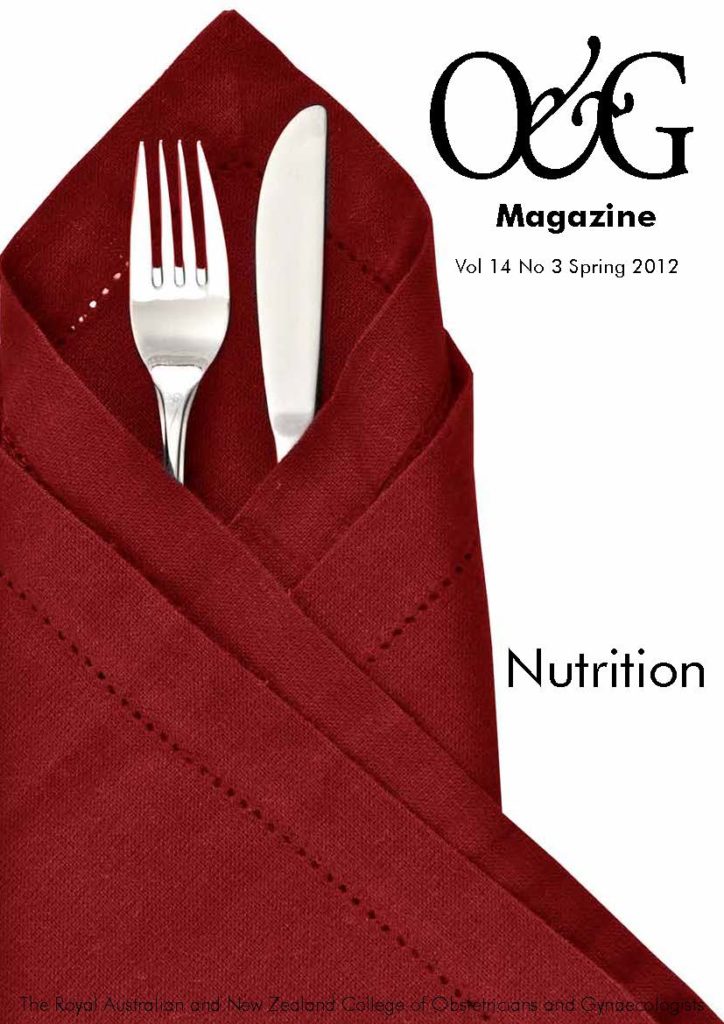With many different commercial supplement products on the market, what should pregnant women be taking and why?
The dietary intake of women of childbearing age in New Zealand and Australia is relatively poor. Dietary surveys from both countries show female nutritional intake characterised by high total and saturated fat, high sodium, low calcium, low fibre, low dietary folate and low iron. This is indicative of not enough wholegrain carbohydrates, lean protein foods, and fruit and vegetables, too many fast foods and unhealthy snack-type foods. Poor dietary habits appear to continue during the preconception and early gestational period; even in women with a planned pregnancy.1 Improving nutritional intake prior to and during pregnancy should be encouraged by all antenatal health professionals. Nutritional dietary supplementation is common during pregnancy. There is strong scientific evidence for nutritional supplementation during the preconception and gestational period for folic acid, iodine and iron (if deficient). However, there is little evidence to support supplementation with other micronutrients or herbs. Until further research is conducted, it is safer to recommend dietary improvements instead.
Folic acid
Taking 0.4mg folic acid in the preconception period and the first trimester of pregnancy reduces the risk of neural tube defects (NTD) by 70 per cent. Women are recommended to take 0.8mg (New Zealand) or 0.4mg (Australia) per day for at least one month prior to conception and for the first three months of pregnancy.2,3 Choosing foods high in folate, such as leafy green vegetables, wholegrain carbohydrates and folate-fortified foods should also be encouraged. Women with a family history of NTD, a previous NTD-affected pregnancy or who take certain medications should be prescribed the larger dose of 5mg folic acid/day. Obese women (body mass index >30) have reduced folate levels and are at higher risk of an NTD-affected pregnancy, therefore these women should also be prescribed 5mg of folic acid.4,5
Iron
Iron deficiency and anaemia is common in women of childbearing age; seven per cent of females in Australia and New Zealand are iron deficient, and approximately four per cent have iron-deficiency anaemia.6,7 Women at risk of iron deficiency include those following a vegetarian or vegan diet, who have heavy menstruation, a low intake of red meat or exercise heavily. Requirements for iron increase in pregnancy; improving iron status during the preconception period is important as it is difficult to raise iron levels during pregnancy. Appropriate dietary changes should be recommended to improve dietary iron intake and absorption. This includes regular consumption of red meat, chicken, fish, seafood, eggs, as well as vegetarian iron sources such as leafy green vegetables, dried beans, peas, lentils and iron-fortified foods. Vitamin C increases iron absorption; women should be encouraged to have colourful vegetables with meals, or a piece of fruit immediately after main meals. Conversely, phytates (found in unprocessed bran), coffee and tea decrease iron absorption and should be avoided for 90 minutes either side of main meals.
Many women will require an iron supplement during pregnancy. Iron supplements available in both countries are Ferro-Tab (65mg elemental iron), Ferro-Gradumet (105mg elemental iron) and Ferrograd C (105mg elemental iron with 500mg Vitamin C). Iron supplements commonly cause constipation and some pregnant women are reluctant to take them. Taking one iron tablet every second day and increasing dietary fibre and water consumption can help ease symptoms.
Iodine
Adequate maternal iodine is important for thyroid function and fetal cognitive development. A high proportion of the Australian and New Zealand population have iodine intakes below nutritional recommendation levels. A 150mcg iodine supplement (Neurokare) is recommended by the New Zealand Ministry of Health to be taken for the duration of pregnancy and breastfeeding. Similarly, women in Australia are recommended to take 150mcg iodine per day8, though there is no specific 150mcg iodine supplement available for prescription/purchase. Instead, over-the-counter prenatal multivitamin products are commonly used to obtain iodine in Australia. Kelp and seaweed tablets should be avoided as their iodine content varies widely. It is unclear at this stage whether there is a benefit to iodine being taken during the preconception period.
Multivitamins
Pregnancy multivitamin supplements have not been demonstrated conclusively to improve pregnancy outcome and are therefore not generally recommended.2,3 Instead, women are advised to take specific micronutrients according to their personal nutritional status and to consume a wide variety of foods to improve their nutritional intake. Multivitamins often contain micronutrients that compete for absorption in the body, such as iron, zinc and calcium. Additionally, many multivitamins do not contain the recommended amounts of folic acid and iodine and, therefore, additional supplements are frequently necessary.
Other micronutrients
There are a range of other micronutrients that are important during pregnancy, but for which nutritional supplementation is not recommended owing to a lack of conclusive evidence and/or that adequate levels can be obtained without supplementation.
For women who have low calcium intake, taking a calcium supplement (1000–2000mg elemental calcium) may reduce the risk of developing pre-eclampsia by around 50 per cent.9
Women following a strict vegan diet may require an intramuscular vitamin B12 injection before or during pregnancy (hydroxocobalamin 1000mcg/ampule).
A clear guideline for vitamin D is yet to be decided; there is controversy over what constitutes a low vitamin D status, who should be prescribed supplements and what dose should be taken. The main source of vitamin D is sunlight; however, there is no set level of sun exposure that generates adequate vitamin D without increasing the risk of skin cancer. In summer, care should be taken between 10am and 4pm when UV levels are highest. Skin exposure to sunlight outside these hours in summer, and around midday in winter, should safely generate adequate vitamin D for most women.
Long-chain polyunsaturated fatty acids (omega-3s) are commonly taken as fish oil supplements. There is little evidence of benefit for this specific population group, aside from a small reduction in preterm birth.10 Omega-3 supplements vary widely in quality and purity. In general, women should be recommended to obtain omega-3s from oily fish rather than supplements; one small serving of oily fish provides one-to-two weeks’ worth of omega-3s.
In conclusion, care should be taken with nutritional supplementation in pregnancy. Women should be recommended to take adequate folic acid, iodine, iron (if necessary) and to consume a wide variety of foods.
References
- Hure, A., Young, A., Smith, R., and Collins, C. Diet and pregnancy status in Australian women. Public Health Nutrition, 2008 12(06): p. 853-861.
- Food and Nutrition Guidelines for Healthy Pregnant and Breastfeeding Women: A background paper. Ministry of Health 2006: Wellington. Healthy Eating at Various Lifestages, Pregnant Women.
- http://www. health.gov.au/internet/healthyactive/publishing.nsf/content/pregnant-women Australian Government, Department of Health and Ageing, 2009.
- Stothard K, Tennant P, Bell R, Rankin J. Maternal Overweight and Obesity and the Risk of Congenital Anomalies A Systematic Review and Meta-analysis. JAMA. 2009;301(6):636-650.
- Modder J, Fitzsimons K. Management of Women with Obesity in Pregnancy. CMACE / RCOG Joint Guideline. 2010.
- A Focus on Nutrition: Key Findings of the 2008/9 New Zealand Adult Nutrition Survey. Ministry of Health 2011: Wellington.
- Rangan A, Aitkin I, Blight G, Binns C. Factors affecting iron status in 15–30 year old female students. Asia Pac J Clin Nutr 1997; 6: 291-295.
- Nutrient Reference Values for Australia and New Zealand, Including Recommended Dietary Intakes. Australian Government, Department of Health and Ageing, NHMRC 2006: Canberra.
- Hofmeyr G, Lawrie T, Atallah A, Duley L. Calcium supplementation during pregnancy for preventing hypertensive disorders and related problems. Cochrane Database of Systematic Reviews 2010; 8. CD001059.
- Makrides M,Duley L,Olsen S. Marine oil, and other prostaglandin precursor, supplementation for pregnancy uncomplicated by pre-eclampsia or intrauterine growth restriction. Cochrane Database of Systematic Reviews 2006; 3. CD003402.






Leave a Reply